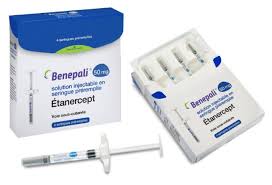Samsung Bioepis said that it has unveiled the real-world data (RWD) of Benepali, an Etanercept biosimilar, in patients with moderate to severe psoriasis, from the British Association of Dermatologists Biologics and Immunomodulators Register (BADBIR).

The company plans to present the results of the research at the 2019 European Academy of Dermatology and Venereology (EADV) Congress in Madrid, Spain, on Thursday. BADBIR is a U.K. and Irish observational study that assessed the long-term safety of biosimilar treatments for psoriasis, in which Samsung Bioepis has participated since May 2016.
The study included 269 BADBIR-registered patients treated with Benepali from Jan. 1, 2016, to Sept. 1, 2018. Among the total patients participating in the trial, the company analyzed the clinical data of 189 patients whose information was available at that time.
At baseline enrollment, the mean disease duration was 22.6 years, and the mean Psoriasis Area and Severity Index (PASI) and Dermatology Life Quality Index (DLQI) scores were 11.6 and 13.1, respectively.
The median treatment period was 14.1 months, and the discontinuation rate was 26.3 percent.
Of the 48 patients who had their PASI score available both at baseline and at six months, disease activity of 20 patients with baseline PASI smaller than 10 did not increase after six months, while disease activity of 28 patients with baseline PASI equal to or larger than 10 reduced after six months
“Results from this study show that BENEPALI was effective when used by patients in the real-life setting,” Samsung Bioepis Vice President Han Seong-won said. “We hope the growing wealth of real-world data on BENEPALI will help physicians make informed decisions when treating patients with biosimilars.”

